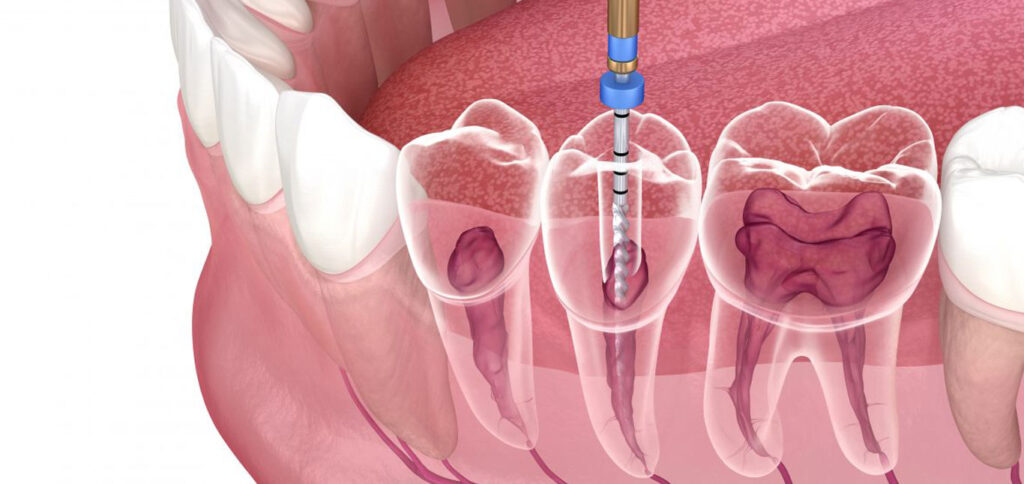Root Canal Treatment
Root canal treatment is a dental procedure used to treat infections or damage within the pulp of a tooth. During a root canal procedure, the dentist removes the infected or damaged pulp, cleans and disinfects the inside of the tooth, and then fills and seals it with a material called gutta-percha. In most cases, a tooth that has undergone a root canal will also need a crown to provide additional support and protect it from further damage.

About Root canal treatment
Technique
- Diagnosis: The dentist or endodontist (a dentist who specializes in root canal procedures) first examines the tooth, typically using X-rays to assess the extent of damage or infection.
- Anesthesia: Local anesthesia is administered to numb the affected tooth and the surrounding area to ensure the patient’s comfort during the procedure.
- Isolation: A rubber dam is placed around the tooth to keep it dry and free from saliva during the procedure.
- Access Opening: The dentist creates a small access opening in the crown of the tooth to reach the pulp chamber and root canals.
- Cleaning and Shaping: The infected or damaged pulp tissue is removed from the pulp chamber and root canals. The interior of the tooth is then cleaned, disinfected, and shaped to prepare for the filling material.
- Filling: The cleaned and disinfected space inside the tooth is filled with a biocompatible material, often a rubber-like substance called gutta-percha, to seal the root canals.
- Sealing: The access opening is sealed with a temporary or permanent filling.
- Restoration: In many cases, a crown or a similar restoration is placed over the tooth to provide strength, protect it, and restore its appearance
Benefits
- Saves Natural Teeth: The primary benefit of a root canal is that it allows you to save a natural tooth that is infected or severely damaged. Preserving your natural teeth is typically the best option for maintaining oral health and function.
- Pain Relief: One of the most immediate and significant benefits is pain relief. A tooth that requires a root canal often causes severe pain, and the procedure eliminates this discomfort. After the root canal, the tooth will no longer be sensitive to temperature, pressure, or biting.
- Prevents Spread of Infection: Root canal treatment removes the infected or inflamed pulp from the tooth’s interior, preventing the spread of the infection to adjacent teeth and surrounding tissues. It helps avoid the need for more extensive dental work or extraction.
- Improves Oral Health: By removing the source of infection and sealing the tooth, a root canal promotes better overall oral health. It can prevent systemic health issues that may arise from untreated dental infections.
- Aesthetics and Function: Root canal-treated teeth are typically restored with a dental crown. This crown not only protects the tooth but also restores its appearance and function, allowing you to chew and speak as you would with a natural tooth.
- Efficient and Cost-Effective: Root canal treatment is often more efficient and cost-effective than tooth extraction followed by the need for tooth replacement options like dental implants, bridges, or dentures. It also requires fewer dental appointments than some alternatives.
- Preserves Jawbone Density: Keeping your natural tooth in place with a root canal helps maintain jawbone density and stability. Tooth extraction can lead to bone loss in the jaw, which may impact facial appearance and overall oral health.
- Eliminates Discomfort: Tooth infections can cause severe discomfort and affect your quality of life. A root canal procedure effectively eliminates this discomfort, allowing you to eat, speak, and smile comfortably.
- Long-Lasting Solution: When performed correctly and maintained with good oral hygiene practices, a root canal can provide a long-lasting solution. Many patients have root canal-treated teeth that last a lifetime.
- Supports Overall Health: Dental infections can impact overall health, potentially leading to systemic conditions. By addressing the dental infection through a root canal, you help maintain better overall health
Frequently Asked Questions
Q. How much it will Cost?
A. Variable.
Q. Is it necessary to get a crown after a root canal?
A. In most cases, a crown is recommended to protect and strengthen the tooth after a root canal, as the tooth may become more brittle.
Q. Is there any pain or discomfort after the procedure?
A. Some mild discomfort or sensitivity is common after a root canal, but it can typically be managed with over-the-counter pain medications and should subside in a few days.
Having some trouble with your teeth?
Schedule an Appointment
Dantspa Helpline
For location and more contact information click here

